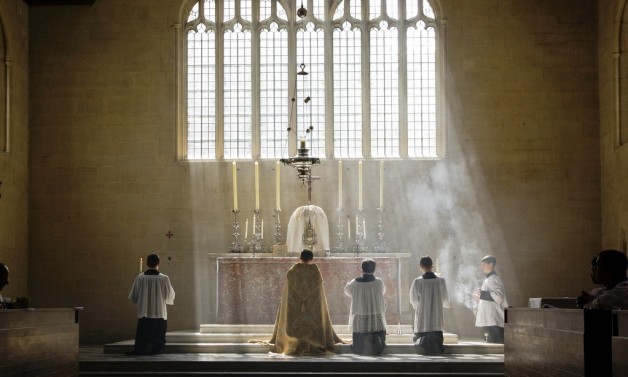Over the course of the summer, one of the brothers and I took turns labeling each other “liberal” or “conservative.” It was always in jest and the sides constantly shifted based on absurd rationales such as: “You poured weiss beer in an ordinary glass! How liberal!” or “You pray the rosary every day? You’re very conservative,” or “You don’t have a problem with eating meat on a Friday [outside of Lent], because you’re a liberal,” or “White wine with pork? How conservative!” By themselves, these actions do not signify being liberal or conservative. Selecting wine or following precise fasting protocol is not a political statement.
As the absurdity of our mutual jabbing illustrates, the relative terms “liberal” and “conservative” are things that everyone thinks he understands, but the list of ideas that one associates with each side can be unique to each person. Why, for instance, should it be “very conservative” to pray the rosary every day? We use these comparative terms as shortcuts to dismiss complex issues with a throwaway phrase.
What would one make of a priest who substitutes an arbitrary hymn for the responsorial psalm and Sanctus, but wears a Roman (“fiddleback”) chasuble and prays the Eucharistic Prayer ad orientem (that is, with the priest and the people facing the same direction)? Or another who grows his hair really long so that people question their stereotype of a priest, but who uses incense every Sunday? Or a congregation where most people sit during the Eucharistic Prayer, but receive Communion on the tongue, kneeling at the altar rail? Such juxtapositions are, admittedly, not typical. Yet, the labels we apply to theological positions and practices can sometimes reveal more about our own prejudices than they meaningfully communicate about the issues themselves.
We have already seen that attempts to apply a quick label to Pope Francis led to frequent mistakes. While the Pontiff has sent some conservatives into a panic and has had some liberals call him one of their own, he calls himself a “son of the Church,” and there is plenty of reason to believe that these previous claims are wishful thinking. But he is not the first pope to undergo such media misunderstanding. Pope Pius IX was widely reported to be a reformer and liberal when he was elected, but when he refused to support a united Italy, people began to see him as a conservative. Many today want to label Pope John Paul II as a conservative, but liturgical traditionalists see him as anything but. These simple labels applied to the Church just don’t work.
While it may be silly to apply political labels to modern popes, it is down right foolish to do so with Christ. Yet that doesn’t stop people from publishing books like Jesus Was a Liberal: Reclaiming Christianity for All, or God is a Conservative.
The plain fact of the matter is that Jesus and Christianity as a whole do not fit easily into our categories and labels. Christ preaches hard moral truths, together with the offer of salvation. The Kingdom of God is open to tax collectors (Matthew 9:9–13, Luke 15:1–7), but money changers need to be run out of the Temple (Matthew 21:12–13, Mark 11:15–17, Luke 19:45–46, John 2:14–16). Divorce is forbidden (Matthew 5:32, 19:9; Luke 16:18), but adultery can be forgiven (John 8:1–11). So is Jesus a liberal or a conservative, a reactionary or a progressive?
Any vision of Christianity that forgets that Christ is the one Savior of all and that we all need saving, is missing something. We cannot reduce the Gospel to mere side taking. We are one Church united in the one Christ, not an assembly with warring factions trying to take control.
✠
Image: Fr. Lawrence Lew, O.P., Blackfriars, Oxford







